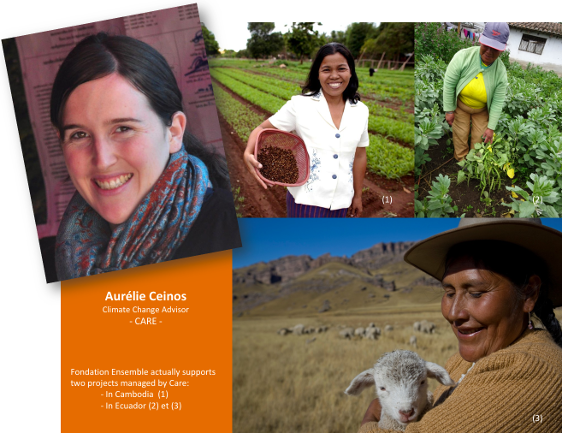‘In tackling climate injustice, there are no small actions. Every single action counts.’

Aurélie Ceinos is Climate Change Advisor for the NGO CARE. Through its work in over 90 countries, CARE provides support for the most vulnerable population groups. Storms, floods, rising sea levels and higher temperatures … climate change is raising the issue of food security for millions of people worldwide. In this interview, she describes the mechanisms that are currently in place and brings us face to face with climate injustice and the need for solidarity.
It is estimated that 1.4 billion people will suffer from hunger by 2080… Have we already lost the battle against climate change?
This estimate alerts us to the scale of what is happening. Natural disasters are occurring at an increasing rate. Rising sea levels, heat waves and rainfall variability are endangering our long-term livelihoods. If we fail to act, more and more crops will be lost. Levels of agricultural productivity will continue to decline while demand for food will continue to rise. By 2100, a tenth of the world population will be hard hit by rising sea levels, leading to the displacement of millions of people. Food security and protecting the world’s poorest populations against climate change are two of the major challenges. It is important to remember that those who have contributed the least to global warming are the first to be affected. And that most lack the means to implement sustainable adaptation strategies. This clearly raises the issue of climate injustice.
Was the Paris Agreement’s goal of limiting global warming to below 2°C or even 1.5° C by the end of the century ambitious enough?
It was a decisive step to the extent that developed and developing countries agreed on the same objective for the very first time. However, the measures adopted at the level of individual States are sorely lacking in ambition. We are still on track for a 3°C rise, even though the adverse effects on millions of individuals throughout the world can be seen on a daily basis.
The Foundation is supporting two CARE projects, in Cambodia and Ecuador. In what way is the climate methodology you are using innovative?
All too often, discussion on agroclimatic information and various types of modeling remains high-level and is not applied in the field. The method we are developing at CARE is inherently participatory. It has three lines of action: facilitating access to climate information, limiting both risks and impacts, and encouraging sustainable agroecological practices. In the project supported by the Foundation in Cambodia, meteorologists and beneficiaries have worked together proactively on the variability of the rainy season, sharing forecast data and traditional knowledge. This dialogue led to the development of several possible climate scenarios (over four years) with corresponding adaptation strategies. This climate methodology was successfully applied for the first time in Kenya and is now being replicated in several countries (India, Niger, etc.).
How are these adaptation strategies applied at grassroots level?
Obviously, it varies according to the context. In India, the producers who worked with our teams were prompted either to review their crop storage systems well in advance, or to plant what are known as ‘off-season‘ crops that have a short growing cycle or are resistant to flooding. In Ecuador, as part of another project supported by the Foundation, several groups of villagers are currently being trained in high-altitude farming techniques for sustainable conservation of their water resources. Everyone is gradually becoming aware that these climate resilient methods are now indispensable and bring long-term benefits.
Faced with the challenges of climate change, how can we remain optimistic?
Look at the next generation! Wherever I go, I sense a growing awareness. This helps me realize that, even if what I do is only a drop in the ocean, it is one action among many others. In fact, there are no small actions. There is the sum of all our actions. That’s what matters.
Access the factsheets on the CARE projects supported by the Foundation.


